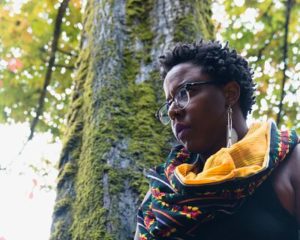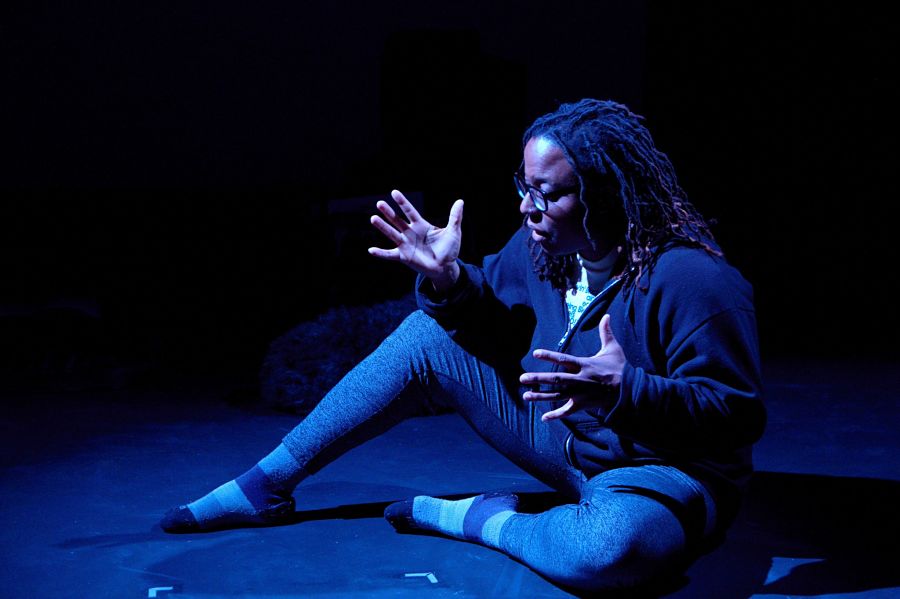“Most sound cues are abrupt interruptions. They take the performer from their story and force them into the larger socially constructed narrative.”
That introductory stage direction from Jéhan Òsanyìn’s autobiographical play Yankee Pickney parallels an interesting challenge for a journalist: How do you write about someone who won’t be defined by the world around them?
Òsanyìn (they/them), who generates more warmth in the cold void of Zoom than seems humanly possible, is an all-around theatre artist, a director, playwright and actor—though, they say, one of their current projects, adapting and directing N.K. Jemisin’s lesbian steampunk sci-fi story The Effluent Engine for Book-It Repertory Theatre, feels more like conducting an orchestra.
“The way that I rule my life, and I used to tell my fifth-grade students this, is beautiful failure,” Òsanyìn said with a laugh in a recent chat. “Just make a choice and we’ll roll with it. That’s my artistic career.”
They’re also a ceramic artist, teacher, outdoor educator, activist, facilitator, and the founder of Earthseed, an organization “that uses theatre and wild spaces to decolonize those spaces in the bodies that pass through them.” Speaking at a recent online symposium of Seattle theatre leaders, Òsanyìn was also an evangelist for new artistic business models, like the ever-evolving model they’re building with Earthseed.
“Nonprofits thrive because rich folks, who are deeply rooted in capitalism, get a tax benefit for giving to theatres,” they said. “I’m excited for theatres to look at business structures that are not rooted in the nonprofit industrial complex and then contribute to the theatre industrial complex, because we need something different.”
During that same symposium, Òsanyìn was the only person to ask fellow participant Braden Abraham, artistic director of Seattle Repertory Theatre, a kind but pointed question about the equity practices in place at Seattle’s major regional theatre. In a city that has a hard time having honest conversations with itself, that kind of candor matters.
“I’ve always been uncompromising,” they told me later, in conversation. “And the fact is that [art] is not 100 percent my job, and I am willing to leave a job at a moment’s notice…because I’ve been poor and lived in my car. There’s nothing else you can do to me that’s going to get me to not say the important thing. So, I just live a life of saying the things that are true in ways that allow someone to see it through love.”
“Theatre is a form of knowledge; it should and can also be a means of transforming society. Theatre can help us build our future, rather than just waiting for it.” –Augusto Boal
Though they grew up on the East Coast, Òsanyìn, the child of immigrants from Jamaica and St. John, U.S. Virgin Islands, describes themself as being “from everywhere and nowhere.” At age 11, Òsanyìn and their older brother were enrolled at Milton Hershey School in Hershey, Pa.—“a boarding school for poor kids” that they would attend through high school—after it became clear to their biological mother that illness would soon keep her from raising them.
A college term with Semester at Sea expanded Òsanyìn’s worldview and theatrical vocabulary: They saw Vietnamese water puppetry and spent time in Kyoto and Shanghai. From a teacher on board, they learned about Augusto Boal’s Theatre of the Oppressed. From South African performance artist Pieter-Dirk Uys they heard a powerful message for a young American abroad, post-9/11: “Do not let the people that are in charge of your country pretend like they all they have all the power. You have a voice.”
After college, the Milton Hershey School hired Òsanyìn to do theatre work with a transition program designed to address the school’s abysmal graduation rates. Instead, they soon started leading backpacking trips, to combine theatre lessons with natural exploration—a process they’re still engaging with through Earthseed.

“With theatre and the wilderness, they’re both asking you to stand still in yourself and to understand who you are,” they explained. “So the wilderness is the given circumstance, right? You have the thunder and the lightning, and the rain and the snow, and the wilderness asks you, Who are you when these things happen? What does that reveal about your personality? What does that reveal about the identities that you’ve formed with your own consent, and without your consent?”
In their own rehearsal rooms, Òsanyìn’s many identities take centerstage. They lead with laughter, but also make space for all of themself as a Black queer artist, because when you center a room’s most marginalized voices, everyone’s needs will get met.
“Theatre has always been a part of my life, since I did my first show at 19, but…I don’t know, I’ve played a slave three times,” they said, with an exhausted shrug. “The body that I have, the story that my body tells, isn’t one that directors are always super excited to put onstage. So I’m not always interested in being commercially viable.”
Don’t misunderstand that last phrase—Òsanyìn definitely wants artists to get paid, but without being beholden to the existing creative power structures that decide which stories have value. “I don’t understand the idea of, ‘Let’s fundraise all of the time,’ because it’s exhausting, and it doesn’t actually work,” they said.
Through Earthseed, they sell scripts and jewelry, make pottery, and partner with companies like Finnriver Cider and PCC, a grocery chain, to fund the organization’s art and activism. Small but mighty, Earthseed’s model is inspired in part by Òsanyìn’s alma mater, a school funded by a chocolate fortune.
“Milton Hershey ‘rented’ Camp Catherine to the Girl Scouts for 99 years,” they said. “I love shit like that. He sold houses to his employees for $1 and then bought them back at market rate when they left the company. That’s what I’m looking for. How can I make my participation in the systems around me work for the communities they were created to actively destruct and structurally oppress?”
“I want there to be something left of me after I am buried. I think it might be this story.” –Yankee Pickney
Òsanyìn premiered Yankee Pickney in 2017, in a small, now-defunct theatre, as a solo show—unless you count the presence of their beloved dog, Garvey, also now sadly deceased.
“I didn’t set out to do autobiographical work,” they said. “I think if I had, I would have felt the pressure that comes with autobiographical works. But I had just lost a friend of mine in a really violent way, and I was like, I think I’ve got to do theatre again.”
The show emerged as an amalgam of autobiography, poem, and community gathering, a powerful cocktail of past and present, full of modern video clips and projected pages from their childhood diaries—so angry, so horny, so funny with the hindsight of several decades. The show’s success in 2017—including a Seattle Times rave and a nomination for a Gregory, Seattle’s local theatre awards—galvanized Òsanyìn to keep making theatre. They’ve been working steadily, onstage and behind the scenes, ever since.
Until, like artists everywhere, Òsanyìn was blindsided by the onset of COVID. In early 2020, they had just returned from a three-month artist residency in Spain and were slated to leave again in one week to perform Yankee Pickney in Pennsylvania. Then everything was canceled.
One morning last March, Òsanyìn donated money to a relief fund for Seattle artists led by author Ijeoma Oluo. Later that night, they were submitting an application for relief from that same fund. Like artists everywhere, they’ve now been in a yearlong holding pattern, marked by pitfalls and possibility.
A recent plumbing disaster means Earthseed won’t be able to return to its current physical home post-pandemic, but Òsanyìn remains calm. “Earthseed will always exist as long as I’m a human,” they said, and only time will tell what the next iteration of the space will look like, when gathering spaces are a thing again.
One exciting possibility: Last fall, the Kilroys co-founder Zakiyyah Alexander put out a call on Twitter for Black trans playwrights, on behalf of a producer looking to staff a television writer’s room. Òsanyìn’s play MISS, about Blackness and education in Seattle, is now on the desks of some powerful people.
“Different TV studios are having conversations with me about staffing, and open writing assignments,” Òsanyìn said. “I just had a really great conversation with a development exec at a studio about telling real stories about queer folks—it doesn’t have to be about the trauma porn.”
There’s an impulse in journalism to define artists into oblivion, into bite-sized marketability. But contradictions are much more interesting. Everyone is a hyphenate, a beautiful failure, capable of Òsanyìn-level uncompromising kindness, if only we resolve to say things that need to be said, and rebuild systems that no longer serve us with love and imagination.
“The year has been so hard,” they said. “I have cried so much. And I’m here for it. This year has gotten me to a place I don’t think I ever would have been, had all of this not happened. I’m so excited about where I’m at right now.”
Gemma Wilson (she/her) is a contributing editor to American Theatre. gemmaspacilwilson.com


